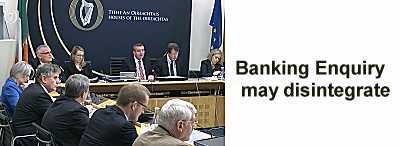In what many commentators have suggested is merely a cosmetic exercise designed to boost Fine Gael and the Labour Party in the run up to an impending General Election the release of the final report by the Banking Enquiry in January is now in some doubt.
The Banking Enquiry was set up to examine the facts surrounding the Government bail-out of the Irish banks. On the one hand there are the Fianna Fail politicians who facilitated the bail-outs, repeatedly pointing out that they had no option but to comply with their European masters who were going to underwrite the loans that were so badly needed. ‘The ATMs were about to run dry’ is their reasoning.

On the other hand you have a Fine Gael machine that is intent on beating Fianna Fail with this stick, despite the fact that they continued to implement the exact same policies over the term of their Government, to the despair of so many who had voted for them.
The timing of the final report is also very telling as a General Election is likely to be called in the early months of 2016.
Against this backdrop there is mounting concern that several members of the Enquiry may refuse to sign off on the final report. Of course the split is along party political lines, once again demonstrating the uselessness of this kind of exercise, where you have rival foxes arguing over who skinned the rabbit.
And what a skinning it was! Ireland was foisted with over 70 Billion Euro of debt by the EU/ECB/IMF that will take nearly half a century to repay. Of course the European ‘troika’ insisted that the German and French bond-holders (ie rich investors), be paid back the money that they had risked or else no money whatsoever would be provided to keep the ATMs working. Effectively this was what the famous documentary maker Michael Moore described as a ‘financial coup d’etat’ (in the context of the similar scheme that occurred in the US).
The Banking Enquiry has members from all of the main political parties including Fianna Fail, Fine Gael, the Socialists, while Independents are also well represented.
How could any kind of consensus ever be expected to be reached among such a disparate group of people with such different agendas remains a mystery. But perhaps consensus was never the point of the exercise. There is a General Election on the way after all.
 Michael Green is Manager of The Information about Ireland Site
Michael Green is Manager of The Information about Ireland Site